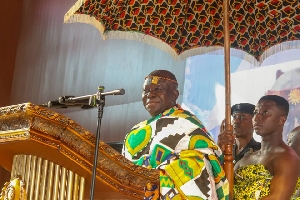Business News of Monday, 12 June 2017
Source: thebftonline.com
Bond critics hurting economic recovery efforts – Ofori-Atta
The Finance Minister, Ken Ofori-Atta, has said critics of the cedi denominated US$2.25 billion bond risk scuttling government’s efforts at restoring the economy to a path of growth, following the devastating setbacks economic recovery efforts suffered in 2016.
The minister came under heavy criticism from members of the opposition NDC, who accuse him of favouring his friends in the US$2.25 billion cedi denominated bond issue, with US-based fund managers Franklin Templeton Investments taking as much 95 percent.
The ex-government officials accused the Finance Minister of influencing the sale to favor a certain Trevor Trefgarne, who happens to be on the board of Franklin Templeton and also serves as the Board Chairman of the Enterprise Insurance Group, a company which Mr. Ofori-Atta is said to have ties with.
Speaking in Parliament after he was summoned there by the minority, the Ken Ofori Atta faught back, saying, “as a country, we must appreciate and recognise the potentially disastrous consequences some of the discussions on air about this bond could have on investor confidence in our country, a safe haven for investment and growth.”
According to the Finance Minister who briefed Parliament about the various bonds issued in April, it is more worrying when the criticisms were coming from certain quarters that are expected to be informed and responsible.
“For such a non-issue to be made such a big issue can make some wonder if the motive is to discourage and thwart efforts towards fixing the mess which the previous administration left behind,” the Finance Minister said.
Explaining the bond issuance process, Mr. Ofori-Atta said, like previous bonds, these bonds were issued in a competitive and transparent bidding processes, managed by our Joint Book Runners (JBRs), namely: Barclays, Stanbic and SAS, who were appointed in 2015.
“As is the normal practice since the book building process began in 2015, the joint book runners announced the sale of the bonds as per the 2nd quarter issuance calendar. Subsequently, primary dealers, who are mostly banks, mobilised interested foreign and local investors to participate in the sale,” he said.
The Finance Minister said foreign investors have been participating in domestic bonds since 2006 and that this particular bond is no different given that even as recent as last year, a 10-year bond issued had 90 percent foreign participation.
The bond issuance, Mr. Ofori-Atta said, was part of government’s debt management strategy where short-term debts are being exchanged for long-term debt.
“We borrowed billions without adding a pesewa to Ghana’s debt stock. Although in the initial instance, the gross domestic debt increases, because we have built up assets in our books, if the focus is to change the risk structure of the existing debt stock. We therefore recognise our liabilities and assets,” he said.
Contrary to the minority’s claims of financial loss, Mr. Ofori-Atta said, the expected savings from the transaction in respect of interest cost is estimated at GH¢612 million in 2017.
“This clearly shows the financial savings we have accrued to government. In other words, we borrowed not to increase our debt stock but rather to decrease the cost of servicing preexisting debts,” he told Parliament.
Boosting reserves
Government, in early April, raised US$2.2 billion from a sale of long-dated domestic bonds, which boosted its central bank reserves by a third.
Offshore buyers constituted 90 percent of accepted bids, according to Barclays Bank Ghana sources.
According to Reuters, the sale represents the largest amount issued by a sub-Saharan African country in a day.
"(It) is an indication of the strong appetite for Ghana Bonds due to the markets renewed confidence in the long term prospects of the Ghanaian economy," Finance Minister Ken Ofori-Atta said.
It is also a major vote of confidence in the new government’s economic policies, fiscal measures and programmes as outlined in the 2017 budget, he added.













